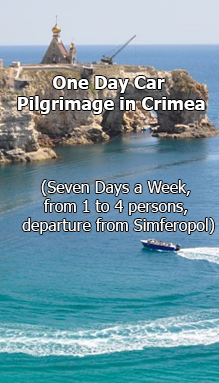Gurzuf
Gurzuf (Mountain Valley) is a picturesque Crimean scenery which lies 16 km to the east of Yalta.
The first written reference about Gurzuf occurs in the writings of the Byzantine writer Procopius (500–562) who lived at the time of the emperor Justinian I (483–565). Procopius writes about the construction of a Byzantine fortress “in the district of Gurzovit”.
In the 8th century, the fortress had grown in size and soon was surrounded by a second ring of fortification. Though the fortress was destroyed by Khazars, by the middle of the 12th century it was rebuilt again. The Arab geographer al-Idrisi was able to write about the “flourishing town” of Garzuni. The town was destroyed and changed hands so often that by the end of the 15th century it had become a small village.
At the beginning of the 19th century Gurzuf became the property of the Novorossiysk governor-general, the Duke de Richelieu (1766–1822). A house was built for him. It was the only two storeyed house on the Southern coast of Crimea. In 1920 it was rented by a hero of the Patriotic War of 1812, General Nickolai Rayevsky.
With the Rayevskys the great Russian poet Alexander Pushkin spent 3 “the happiest” weeks in Gurzuf. Here he wrote a cycle of poems about Taurida. Later he promised: “My spirit to Yurzuf will fly…” On June 6, 1989, on his 190th birthday A. S. Pushkin Literary Memorial Museum was opened in Gurzuf.
After Richelieu’s death in 1822, the Gurzuf estate went to Count Mikhail Vorontsov (1782–1856), and later, in 1840, Senator I. Funduklei bought it. Then it passed to the merchant Gubonin, who built several hotels and opened a restaurant in the park around the estate.
The picturesque scenery of the park is adorned with fountains, which bear beautiful names, like “The Nymph”, “Rachel”, “The First Love”, and “The Muse”.
Gurzuf is a famous resort. Its main attraction is the unique “young republic” of Artek, which history began in 1925.
The names of great writers, artists and composers are associated with Gurzuf, including llya Repin, Maxim Gorky, Alexander Kuprin, Fyodor Chaliapin, Anton Chekhov, Adam Mickiewitch.












